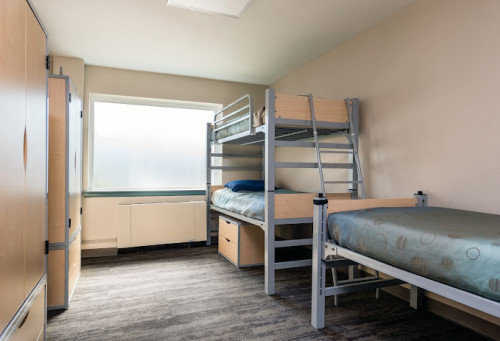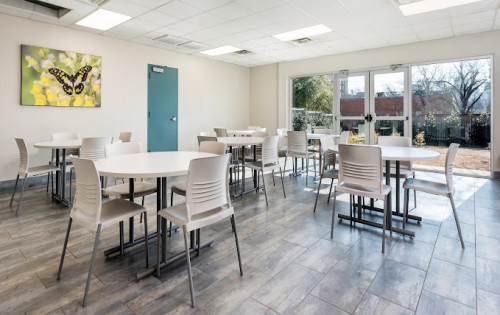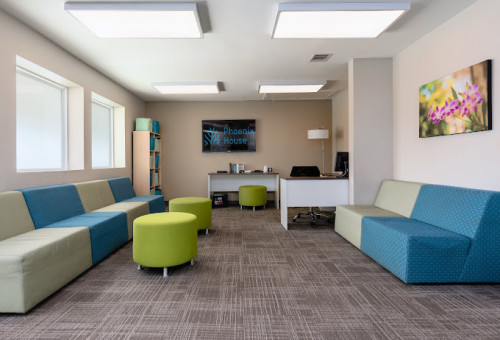






Phoenix House Dallas
Treatment Focus
This center treats substance use disorders and co-occurring mental health conditions. Your treatment plan addresses each condition at once with personalized, compassionate care for comprehensive healing.
Primary Level of Care
Offering intensive care with 24/7 monitoring, residential treatment is typically 30 days and can cover multiple levels of care. Length can range from 14 to 90 days typically.
This provider hasn't verified their profile's information. Are you the owner of this center? Claim your listing to better manage your presence on Recovery.com.
Treatment Focus
This center treats substance use disorders and co-occurring mental health conditions. Your treatment plan addresses each condition at once with personalized, compassionate care for comprehensive healing.
Primary Level of Care
Offering intensive care with 24/7 monitoring, residential treatment is typically 30 days and can cover multiple levels of care. Length can range from 14 to 90 days typically.
Insurance Accepted
This center accepts insurance, exact cost can vary depending on your plan and deductible.
Phoenix House Dallas
Phoenix House Dallas
About Phoenix House Dallas
Phoenix House is a dual-diagnosis treatment provider with several locations offering residential and outpatient treatment to adults and teens who are struggling with addiction and co-occurring mental health. Their Dallas location offers evidence-based treatment and a nurturing environment for teens aged 13-18 with substance abuse disorders. They have both residential and outpatient programs.
Phoenix House offers strength-based, holistic treatment for addiction and underlying mental health disorders in a structured and healing environment. Skilled and compassionate master’s level clinicians provide evaluations and assessments, life skills education, gender-specific groups, individual, group, and family counseling, relapse prevention counseling, and medical, dental, and psychiatric evaluation and treatment.
Individualized Care
Phoenix House in Dallas offers teenagers a safe and supportive environment to focus on recovery. Clients go through an initial medical and psychological assessment that will identify their unique treatment needs and provide them with a comprehensive treatment plan. Individually tailored treatment plans are designed to meet each individual’s treatment needs, and case management services provide regular monitoring to track progress and make adjustments accordingly. Clients will work toward their recovery goals with a team of qualified professionals that include licensed therapists, counselors, and trained medical staff who are committed to providing quality care in an uplifting environment.
Their highly structured dual-diagnosis program offers holistic, evidence-based treatment. Residential treatment may consist of individual and group therapy, relapse prevention counseling, educational and vocational support, parent and family educational seminars, meditation classes, a workout club, and life skills training. They use proven methods such as cognitive behavioral therapy (CBT), dialectical behavioral therapy (DBT), and trauma-specific therapy as part of their programs. Experiential therapy methods may include creative activities led by a therapist, such as art, dance, or music therapy used to promote social and emotional well-being.
Residential services provide drug and alcohol treatment, address underlying co-occurring mental health disorders, drug testing, and psychoeducational therapy groups. They have an intensive outpatient program (IOP), consisting of 9 or more hours of treatment after school hours, and a traditional outpatient program (OP) with fewer than 9 hours per week. Outpatient programs meet from 1-5 days per week.
Phoenix House also offers medication-assisted treatment (MAT) to clients who are struggling with physical dependency, which includes medications that can help manage and alleviate the physical symptoms of withdrawal such as methadone or suboxone.
Phoenix House is active in engaging with the community, advocating for addiction and mental health treatment and recovery resources. After treatment, clients are connected to a strong alumni network, providing ongoing support and allowing them to stay connected, provide encouragement, and share experiences with others in recovery. Discharge planning can assist clients in finding outpatient support once they complete their residential program.
Phoenix House in Dallas is CARF accredited and accepts most major credit cards and insurance providers.

Center Overview
Treatment Focus
This center treats substance use disorders and co-occurring mental health conditions. Your treatment plan addresses each condition at once with personalized, compassionate care for comprehensive healing.
CARF Accredited
CARF stands for the Commission on Accreditation of Rehabilitation Facilities. It's an independent, non-profit organization that provides accreditation services for a variety of healthcare services. To be accredited means that the program meets their standards for quality, effectiveness, and person-centered care.
Insurance Accepted
Pricing and Program Length
Estimated Center Costs
Center pricing can vary based on program and length of stay. Contact the center for more information. Recovery.com strives for price transparency so you can make an informed decision.
Levels of Care







Your Care Options
Specializations
Co-Occurring Disorders
A person with multiple mental health diagnoses, such as addiction and depression, has co-occurring disorders also called dual diagnosis.
Medication-Assisted Treatment
Combined with behavioral therapy, prescribed medications can enhance treatment by relieving withdrawal symptoms and focus patients on their recovery.
Who We Treat
Adolescents
Teens receive the treatment they need for mental health disorders and addiction, with the added support of educational and vocational services.
Approaches
Personalized Treatment
The specific needs, histories, and conditions of individual patients receive personalized, highly relevant care throughout their recovery journey.
Twelve Step
Incorporating spirituality, community, and responsibility, 12-Step philosophies prioritize the guidance of a Higher Power and a continuation of 12-Step practices.
Experiential
Expressive tools and therapies help patients process past situations, learn more about themselves, and find healing through action.
Gender-Specific
Separate treatment for men or women can create strong peer connections and remove barriers related to trauma, shame, and gender-specific nuances.
Holistic
A non-medicinal, wellness-focused approach that aims to align the mind, body, and spirit for deep and lasting healing.
Evidence-Based
A combination of scientifically rooted therapies and treatments make up evidence-based care, defined by their measured and proven results.
Strengths-Based
Providers using a strengths-based philosophy focus on the positive traits of their patients, creating a positive feedback loop that grows confidence.
Therapies
1-on-1 Counseling
Patient and therapist meet 1-on-1 to work through difficult emotions and behavioral challenges in a personal, private setting.
Family Therapy
Family therapy addresses group dynamics within a family system, with a focus on improving communication and interrupting unhealthy relationship patterns.
Psychoeducation
This method combines treatment with education, teaching patients about different paths toward recovery. This empowers them to make more effective decisions.
Trauma-Specific Therapy
This form of talk therapy addresses any childhood trauma at the root of a patient's current diagnosis.
Nutrition Counseling
Nutritious food helps patients heal from within, setting them up for mental and bodily wellness as they learn about healthy eating.
Conditions We Treat
Trauma
Some traumatic events are so disturbing that they cause long-term mental health problems. Those ongoing issues can also be referred to as "trauma."
Substances We Treat
Co-Occurring Disorders
A person with multiple mental health diagnoses, such as addiction and depression, has co-occurring disorders also called dual diagnosis.
Drug Addiction
Drug addiction is the excessive and repetitive use of substances, despite harmful consequences to a person's life, health, and relationships.
Heroin
Heroin is a highly addictive and illegal opioid. It can cause insomnia, collapsed veins, heart issues, and additional mental health issues.
Opioids
Opioids produce pain-relief and euphoria, which can lead to addiction. This class of drugs includes prescribed medication and the illegal drug heroin.
Alcohol
Using alcohol as a coping mechanism, or drinking excessively throughout the week, signals an alcohol use disorder.
Languages
Aftercare
Care Designed for Your Needs
Personal Amenities
Amenities
Special Considerations
Healthy Meals are provided
Great food meets great treatment, with providers serving healthy meals to restore nutrition, wellbeing, and health.
Gender-specific groups
Patients in gender-specific groups gain the opportunity to discuss challenges unique to their gender in a comfortable, safe setting conducive to healing.
Activities
Yoga
Yoga is both a physical and spiritual practice. It includes a flow of movement, breathing techniques, and meditation.
What people are saying
Treatment
3.7
Accommodations
2.0
Food & Nutrition
1.7
Value
2.5
DEG
Reviewed 04/22/16
Review from Rehabs.com
Joshua
Reviewed 04/22/16
Review from Rehabs.com
Justin
Reviewed 04/22/16
Review from Rehabs.com





